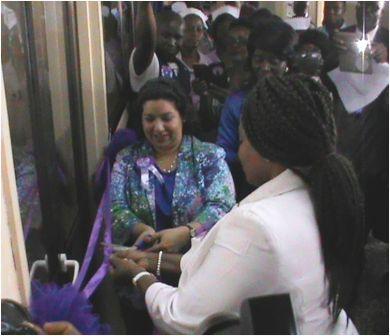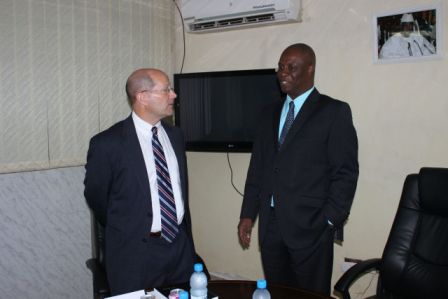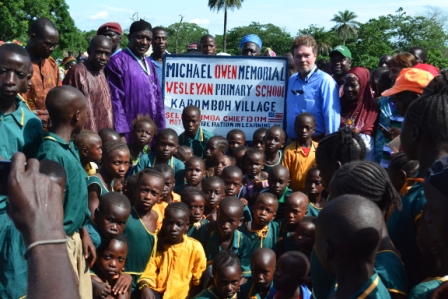Ambassador praises hospital in Sierra Leone
April 21, 2011 – The U.S. ambassador’s enthusiasm for The United Methodist Church’s health-care and humanitarian efforts was obvious when he emerged from Mercy Hospital’s research lab. (Photo: Anna Owen (left) greets a staff member of Helping Children Worldwide. Ambassador Michael Owen (right) and Bishop John K. Yambasu (center left) look on. UMNS web-only photos by Phileas Jusu.)
“The lab is probably one of the best labs in all of Sierra Leone,” said Michael Owen, ambassador to Sierra Leone. Owen was in the Kulanda Town Community of Bo to tour the hospital and Child Rescue Center, both of which he praised for helping the country heal in the nine years since a long civil war.
He and his wife, Anna, were joined by a flock of dignitaries as they visited the two facilities. The United Methodist Church, which has three major hospitals and four health centers in the country, is among Sierra Leone’s key health-service providers.
The trip to Bo emphasized the important role the church is playing in the healing process. Needy and homeless children, plucked from the streets of Sierra Leone during the depths of an 11-year civil war, were the first to receive hope and help from the Child Rescue Center. Their medical needs have been tended by Mercy Hospital.
Building relationships
Both facilities are supported by Helping Children Worldwide, a foundation formed by nine churches in Virginia. Mercy Hospital also receives funding through The United Methodist Church’s designated-giving program as Advance Special No. 15173A.
Herndon, Va.,-based Helping Children Worldwide provides 95 percent of the funds for Mercy Hospital. The foundation’s African Programs division, supported by 12 United Methodist church partners in Texas and Virginia, provides financial planning and oversight as well as strategic planning and program development for the Bo facilities. It also tends to the human resources needs of employees.
Several Helping Children Worldwide board members traveled from the United States to participate in the ambassador’s visit, which was planned as a way of creating a relationship and perhaps partnerships between the facilities, the embassy and America.
Partnerships were on the ambassador’s mind after he emerged from the lab. “We’re going to partner them with labs in America,” he said, citing the high standard of the facilities.
Serving remote communities
The hospital’s laboratory services include clinical investigation and research technology. The visit went well beyond the labs, as the ambassador’s party toured the 26-bed hospital that offers outpatient and in-patient services.
The hospital’s specialties include a prenatal clinic, which is much needed, as post-war Sierra Leone ranks among the countries with the highest infant and maternal mortality rates, according to the United Nations Human Development Index.
The hospital also offers therapeutic and treatment programs for malaria, HIV and other diseases.
During the tour, Bishop John Yambasu said the church wants to expand aid into remote provinces where health care is virtually non-existent.
“We really want to train our own nurses who are ready to go and work in the remote communities where health needs are greatest,” Yambasu told the ambassador.
“When you actually go into the interior of our country, people are dying every day in record numbers just because they do not have access to (a) medical facility,” he said.
The problem is that trained nurses and medical personnel prefer to work in the cities, he said.
This prompted Anna Owen to add that during a visit with health-care workers in Makeni, in northern Sierra Leone, she was told they “were not very keen on going into the remote communities where most of the deliveries and maternal deaths take place.”
Ambassador Owen praised the Child Rescue Center, where 23 girls and 17 boys – orphans and street children – receive food, shelter, clothing, education and skills training all the way through their secondary school years.
“I appreciate the Americans who are part of Helping Children Worldwide who are coming here and have really made a sustained effort to support this facility for the last 10 years,” he said.
The children’s facility – which he called “a center of excellence” – has also spurred talk about partnerships in the United States, he said.
‘Transforming lives’
The Rev. Tom Berlin, who has led many work teams to help the facility in the last 10 years, was excited by the tour.
“It’s something very powerful when we come to know and love each other across cultures. We come to see each other as sisters and brothers,” Berlin said. His friendship with the bishop led to the founding of the center 10 years ago, with Yambasu serving as the first director.
The success of the Child Rescue Center also drew praise from Liberia Bishop John Innis during a March address to the Sierra Leone Annual Conference. “This is our pride. It is an excellent setup. It is transforming lives. It is making children to be educated; it is making children to be vision-driven,” he said.
He thanked Berlin – who has led many groups to the center – and the Virginia Annual Conference “for committing your lives to transforming the lives of our future leaders.”
Berlin was similarly moved by what he saw during his tour with the ambassador of the facilities in southern Sierra Leone: “The will of God has uniquely brought us together not simply to bless the children, not simply to bless the hospital patients, but to bless us all.”
By Phileas Jusu: Jusu is director of communications for the Sierra Leone Conference of The United Methodist Church.
Reproduced courtesy United Methodist News Service – www.umcom.org
Stay with Sierra Express Media, for your trusted place in news!
© 2011, https:. All rights reserved.







